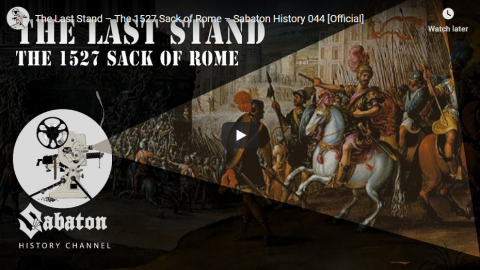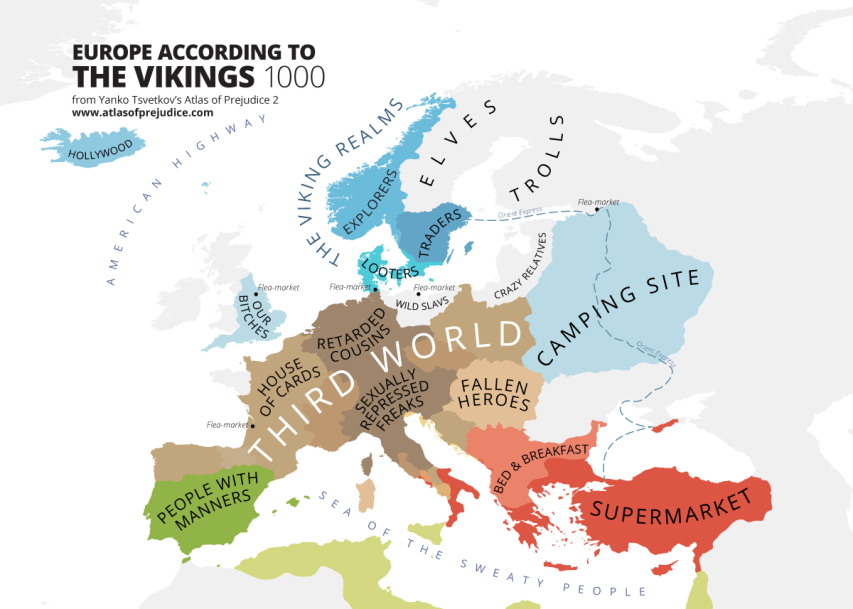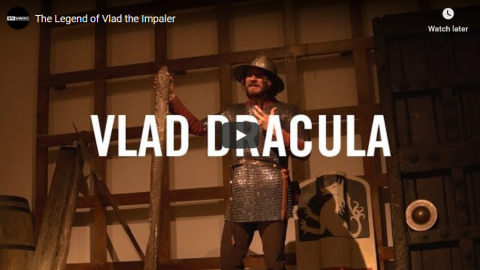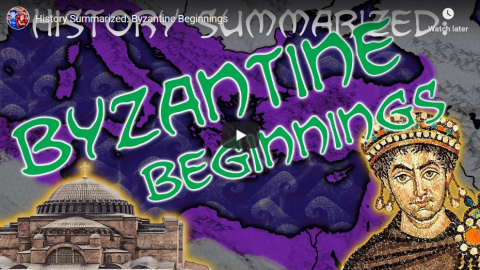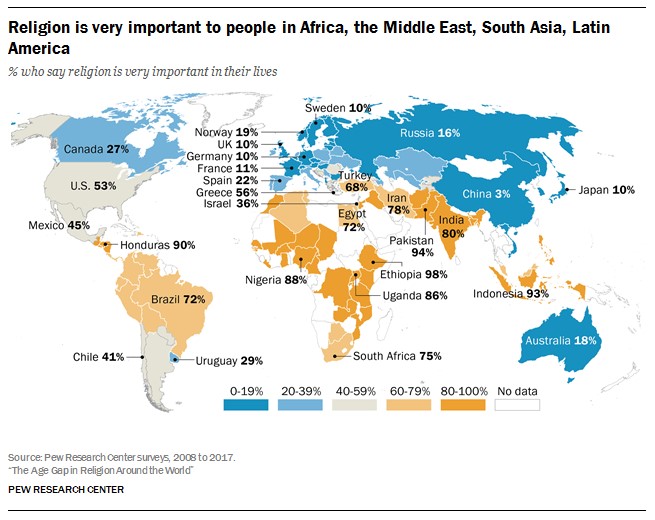Sabaton History
Published 5 Dec 2019In 1527, a large Holy Roman army consisting of Germans, Spaniards and Italians march on Rome frustrated over unpaid wages and lacking supplies. Pope Clement VII seeks shelter as Rome is pillaged and burned while his brave Swiss Guard makes a heroic last stand.
Support Sabaton History on Patreon: https://www.patreon.com/sabatonhistory
Listen to The Last Stand (where “The Last Stand” is featured):
CD: http://bit.ly/TheLastStandStore
Spotify: http://bit.ly/TheLastStandSpotify
Apple Music: http://bit.ly/TheLastStandItunes
iTunes: http://bit.ly/TheLastStandItunes
Amazon: http://bit.ly/TheLastStandAmz
Google Play: http://bit.ly/TheLastStandGooglePlayWatch the official lyric video of “The Last Stand” here: https://www.youtube.com/watch?v=BwfJs…
Listen to Sabaton on Spotify: http://smarturl.it/SabatonSpotify
Official Sabaton Merchandise Shop: http://bit.ly/SabatonOfficialShopHosted by: Indy Neidell
Written by: Markus Linke and Indy Neidell
Directed by: Astrid Deinhard and Wieke Kapteijns
Produced by: Pär Sundström, Astrid Deinhard and Spartacus Olsson
Creative Producer: Joram Appel
Executive Producers: Pär Sundström, Joakim Broden, Tomas Sunmo, Indy Neidell, Astrid Deinhard, and Spartacus Olsson
Post-Production Director: Wieke Kapteijns
Production Intern: Rune Vaever Hartvig
Edited by: Iryna Dulka
Sound Editing by: Marek Kaminski
Maps by: Eastory – https://www.youtube.com/c/eastoryArchive by: Reuters/Screenocean https://www.screenocean.com
Music by Sabaton.Sources:
– Rijksmuseum
– Fondo Antiguo de la Biblioteca de la Universidad de Sevilla
– A massacre in a church during the Sack of Rome: a priest is about to be stabbed and another priest is lying dead on the floor before the altar. Wood engraving by R. Venturi after himself. Credit: Wellcome Collection. CC BY
– Guy de Chauliac bandaging the leg of Pope Clement VII at Avi. Oil painting by Ernest Board. Credit: Wellcome Collection. CC BY
– Photo of Sistine Chapel ceiling by Qypchak
– Photo of Arco delle Campane by Przemek PietrakAn OnLion Entertainment GmbH and Raging Beaver Publishing AB co-Production.
© Raging Beaver Publishing AB, 2019 – all rights reserved.
December 6, 2019
“The Last Stand” – The 1527 Sack of Rome – Sabaton History 044 [Official]
December 4, 2019
Desiderius Erasmus of Rotterdam
David Warren on discovering Erasmus as a teenager:
Erasmus makes an adequate hero for the adolescent boy. He was mine, for a time, even more than his friend Thomas More, who was forced on our consciousness in the late ‘sixties by Robert Bolt’s play-cum-movie (A Man for All Seasons). We were all herded from the High School to the Cinema, and rolled home in our yellow schoolbus full of something — youthful idealism — that could then be applied to various dubious causes. There was this Penguin with the title, Utopia. Without reading it, even in this pop translation, we became wise in our conceit, which is to say, conceited little wiseacres. I don’t “look back in anger,” however. That was for the ‘fifties. I look back through a fog of marijuana smoke, from the Age of Hippies.
Portrait of Desiderius Erasmus of Rotterdam (1466-1536) with Renaissance Pilaster
Hans Holbein (1497-1543) via Wikimedia Commons.Drugs saved us. Had it not been for them, we might have accomplished worse horrors. By the ‘seventies, when a new nadir was being established for Western Civ, another, visibly duller generation was coming along. Ours was the first to be perpetually schooled (I would not say “educated”). I left high school, home and Canada, in the year of grace 1969, now half a century ago; and when I returned to settle in the 1980s, I found my old schoolmates still in college. To be fair, at least some were homemakers by then, or garage mechanics. It was so long ago that this word, “homemakers,” could still be used without feminist “irony,” if you came from a small town.
But the Erasmus who had appealed to me, as teenager, was the author of the Colloquies, and the Praise of Folly (a keepsake from his friendship with More). I imagined him gentle, humorous, wise, yet full of righteous fire. Too, apparently, a bit of a whiner. I was dazzled by his production of the first printed edition of the Greek Testament, and did not yet realize that it was a slapdash performance, rushed to beat the version of Cardinal Ximenes, already set in type but not yet bound — a proof that there is nothing new under the sun.
Erasmus’ obsessive struggle against the reputation of Saint Jerome, whose central rôle in the history of our Vulgate he tried to deny, and whom he presumptuously corrected on innumerable points — himself straying in and out of heresy — ended in repeated embarrassments for him. But to my adolescent mind, he must always be the hero, beating furiously against the hidebound.
December 1, 2019
QotD: Religious belief
To a certain stratum of our intelligentsia, you’re supposed to believe in God like you believe in continental drift, or the tides, or the yearly reappearance of Shamrock Shakes at McDonald’s. The idea that it’s a two-way conversation strikes many as nonsense, proof that we’re dealing with someone two steps removed from worshipping the moon. I don’t say this as someone who gets daily briefings from the Big Guy Upstairs; for whatever reason, I’ve never felt as if God had me on speed dial. This hasn’t influenced my thoughts about religion in the least, believe it or not. I don’t need Carl Sagan showing up at my door to believe there are billions and billions of stars.
James Lileks, The Bleat, 2004-10-18.
November 23, 2019
History Summarized: Ireland
Overly Sarcastic Productions
Published 22 Nov 2019Get 3 months of Audible for just $6.95 a month — that’s more than half off the regular price. Choose 1 audiobook and 2 Audible Originals absolutely free. Visit http://www.audible.com/overlysarcastic or text “
overlysarcastic” to 500 500.While the rest of Europe was flailing aimlessly through the Dark Ages, Ireland was both preserving the ancient world and setting the stage for the Medieval Period. Then England showed up.
Sources & Further Reading:
How the Irish Saved Civilization: https://www.audible.com/pd/How-the-Ir…
Modern Ireland: 1600 — 1972 by R.F. FosterMusic from https://filmmusic.io
“Marked”, “Traveler”, “God Rest Ye Merry Celtishmen” by Kevin MacLeod (https://incompetech.com)
License: CC BY (http://creativecommons.org/licenses/b…)Our content is intended for teenage audiences and up.
DISCORD: https://discord.gg/sS5K4R3
PATREON: https://www.Patreon.com/OSP
MERCH LINKS: https://www.redbubble.com/people/OSPY…
OUR WEBSITE: https://www.OverlySarcasticProductions.com
Find us on Twitter https://www.Twitter.com/OSPYouTube
Find us on Reddit https://www.Reddit.com/r/OSP/
November 12, 2019
QotD: The crimes of the Righteous
There was no mercy in them, not even those specks of humanity that can occasionally be glimpsed in the most heartless of souls. Priests, judge, scribe, and torturers acted with such rigorous coldness and distance that that was precisely what evoked the most horror. Even more blood-curdling that the suffering they were capable of inflicting was the icy determination of those know they are backed by divine and human laws and who at no moment doubt the righteousness of what they are doing.
Later, with time, I learned that although all men are capable of good and evil, the worst among them are those who, when they commit evil, do so by shielding themselves in the authority of others, in their subordination, or in the excuse of following orders. And even worse are those who believe they are justified by their God. Because in the secret dungeons of Toledo, nearly at the cost of my life, I learned that there is nothing more despicable or more dangerous than the malevolent individual who goes to sleep every night with a clear conscience. That is true evil. Especially when paired with ignorance, superstition, stupidity, or power, all of which often travel together.
And worst of all is the person who acts as exegete of The Word — whether it be from the Talmud, the Bible, the Koran, or any other book already written or yet to come. I am not fond of giving advice — no one can pound opinions into another’s head — but here is a piece that costs you nothing: Never trust a man who reads only one book.
Arturo Pérez-Reverte, Purity of Blood, 1997.
November 9, 2019
The Milk Dud and “sin”
Chris Selley believes that introducing the notion of “sin” as an appropriate thing to discuss with a politician will be a very bad idea for Canadian politics:

Andrew Scheer, paid tool of Big Dairy, chugs some milk during a Press Gallery speech in 2017. I’ve called him the “Milk Dud” ever since.
Screencapture from a CTV video uploaded to YouTube.
At a Wednesday press conference in Ottawa, a Globe and Mail reporter asked Andrew Scheer if he believes homosexuality is a “sin.” He didn’t answer, as has become his trademark on this file; instead he pledged, for the umpteenth time, simply to stand up for gay rights in all their forms.
It has been maddening to watch: Despite literally dozens of opportunities, he could never bring himself to explicitly support equal marriage. Bringing “sin” into the question is a novelty, though, and it’s one of which we need to be exceedingly leery.
[…]
The question of “sin” takes us into new and dangerous territory, however. There is what politicians do, and then there is what they think, and then — buried way down under many layers of irrelevance — there is their personal relationship, if any, with higher powers and their associated scriptures; there is the question of what they think that higher power would make of other people’s behaviour; there is what they believe will happen to those people’s immortal souls.
These are not topics the secular media should be concerning themselves with, and nor should the average voter. No one would approve of someone they like being put through such an inquisition. Liberals would be aghast if their avowedly Catholic leader were asked if his faith played a role in his government not eliminating restrictions on gay and bisexual men donating blood, for example. Liberals often speak glowingly of the days when politicians set aside religion and pursued the greater good — politicians like Pierre Trudeau, a devout Catholic who famously said “what goes on in private between two consulting adults is their own private business,” but who somewhat less famously spoke of “separating the idea of sin and the idea of crime.”
Trudeau Sr. was absolutely right that the state should have no dominion over sin, in any sense of the word. That should go for politics, too. Politicians of known faiths and devoutness have advanced many of progressive Canadians’ most cherished causes — public health care, most notably — and politicians of unknown faiths and devoutness have taken us down dark alleys. And vice versa. There is nothing we can do with information about a politician’s personal metaphysical views except raise new barriers to entry into a politics that needs fewer.
Ten Minute English and British History #11 – King John and the Magna Carta
History Matters
Published 1 Jan 2018Twitter: https://twitter.com/Tenminhistory
Patreon: https://www.patreon.com/user?u=4973164This episode covers the reign of King John and the problems he had securing the Angevin inheritance and the subsequent issues his barons posed. These problems culminated in the signing of the Magna Carta in 1215 which severely limited the strength of John and his son, Henry III, whose reign was overshadowed by the document.
Ten Minute English and British History is a series of short, ten minute animated narrative documentaries that are designed as revision refreshers or simple introductions to a topic. Please note that these are not meant to be comprehensive and there’s a lot of stuff I couldn’t fit into the episodes that I would have liked to. Thank you for watching, though, it’s always appreciated.
November 6, 2019
Whitewashing the Vikings
Sarah Hoyt notices the way history is being presented to subtly (or not-so-subtly) denigrate the recent past and idealize (some of) the distant past:
Their distortion of history so that everything America ever did is wrong and evil-bad is designed to make our own kids hate their own country and imagine themselves as “citizens of the world” which is to say citizens of nowhere.
Which in turn allows for wide open borders which bring in the population of 3rd world serfs the statists count on to keep them in power forever.
For the last ten years I’ve been disquieted and disturbed by the persistent myth of: Our ancestors were far more cleanly, happy and prosperous than we think. Yep. Your foot-in-the-mud ancestor didn’t suffer under the lash of his feudal overlord. Oh, no. He had hot running water, regular baths, religious holidays off and–
Spits. And the girls sang as they wove garlands on Mayday, I suppose.
Most of these myths are arrant nonsense. Some are arrant nonsense on stilts with a dash of oikophobia thrown in.
I’ve mentioned here that I went to the Viking exhibit at the museum some years back, and it was all about how free and egalitarian the Vikings were, male and female. Which I suppose was true, if you miss the large component of slavery. And the fact that they raided foreign shores for slaves and loot. And that almost every skilled artisan was a slave. And–
Then there is the continuous “The Vikings were much cleaner than the Christians and women preferred them.”
First let’s cut the crap. We have zero clue if women preferred them. When the raiders come to town, they don’t stop to ask thee fleeing women to sign “affirmative consent” forms.
Second, yeah, I’m sure in some Viking villages they were cleaner. We do have have reason to suspect some areas had functioning saunas. But then some of the areas raided had functioning Roman baths still extant.
I’m sure for some times and places, that was true. I’m also absolutely sure that for most times and places the Vikings were about as clean as everyone else, which is to say not very, due to the lack of easy-accessible soap (yes, it existed. In certain times and places. NOT everywhere and not of a kind you’d want to use on your skin) of easily accessible acceptable-temperature water, and/or of warm enough places to bathe in.
No, medieval people weren’t as utterly filthy as it’s imagined (though there were some, I’m sure) but I’m also utterly sure, having experienced this in a temperate climate, that washing in winter would be limited, careful, and therefore maybe not as thorough as we imagine. Or to put it another way, when the Victorians went on about catching a chill, they weren’t just blowing smoke, guys. People didn’t willingly strip down and dip in lukewarm water in the dead of winter and when clothes would take forever to dry, unless they had other clothes, and facilities for getting warm right after.
In other words, Vikings and the rest of the Middle Ages were, from our POV a little wiffy. As were most places until the late 20th century.
So why the cleanly and perfumed Vikings (Particularly since the records of the time don’t support this view, except in very few, highly publicized circumstances?)
Oh, that’s the “don’t go imagining Christians were better” wing of the oikophobe chorus. They will tell us Christians were filthy. The pagans, on the other hand, were cleanly and perfumed.
Weirdly the one people we know were cleaner than Christians, also more literate and prone to less domestic violence never come in for praise in these comparisons. I suspect being part of the foundational build of the West, the Jews aren’t considered “wonderfully other” enough. Or given some of the recent bs on the left and the people they embrace, perhaps it’s a hate thing.
BTW that Christians being filthy is bullshit. Later on, in defense of “but medieval people weren’t that filthy” they’ll bring in the injunction to change your underwear daily. Which is more than a little confusing when you researched the heck out of “underwear use” in various places in the renaissance and know most women at least wore none. Eventually you find out the injunction to change underwear was in monasteries. Monk’s orders in fact, also had various guidelines on cleanliness which, for their time, were amazingly enlightened. Even if, yes, by our standards, they were all a bit wiffy.
The same applies to a ton of other things. These revisionists tell us they ate better than we think, oh, and by the way, except for infant mortality they lived as long as we do.
All this is insanity on stilts.
November 3, 2019
QotD: The theocratic Anabaptist State of Münster
A crucial part of the Anabaptist reign of terror was their decision, again prefiguring that of the Khmer Rouge regime in Cambodia, to abolish all private ownership of money. With no money to purchase any good, the population became slavishly dependent on handouts or rations from the power elite. Accordingly, Matthys, Rothmann, and the rest launched a propaganda campaign that it was un-Christian to own money privately; and that all money should be held “in common,” which in practice meant that all money whatsoever must be handed over to Matthys and his ruling clique…
After two months of unremitting propaganda, combined with threats and terror against those who disobeyed, the private ownership of money was effectively abolished in Münster. The government seized all the money and used it to buy goods or hire workers from the outside world. Wages were doled out in kind by the only employer: the theocratic Anabaptist State.
Food was confiscated from private homes, and rationed according to the will of government deacons. Also, to accommodate the host of immigrants, all private homes were effectively communized, with everyone permitted to quarter themselves everywhere; it was now illegal to close, let alone lock, one’s doors. Compulsory communal dining halls were established, where people ate together to the readings from the Old Testament.
The compulsory communism and reign of terror was carried out in the name of community and Christian “love.” This communization was considered the first giant step toward egalitarian communism, where, as Rothmann put it, “all things were to be in common, there was to be no private property and nobody was to do any more work, but simply trust in God.” Somehow, the workless part never seemed to arrive.
[…]
Totalitarianism in Münster was now complete. Death was now the punishment for virtually every independent act. Capital punishment was decreed for the high crimes of murder, theft, lying, avarice, and quarrelling. Death was also decreed for every conceivable kind of insubordination: the young against the parents, wives against their husbands, and, of course, anyone at all against the chosen representative of God on earth, the government of Münster. Bernt Knipperdollinck was appointed high executioner to enforce the decrees.
The only aspect of life previously left untouched was sex, and this deficiency was now made up. The only sexual relation now permitted by the Bockelson regime was marriage between two Anabaptists. Sex in any other form, including marriage with one of the “godless,” was a capital crime.
But soon Bockelson went beyond this rather old-fashioned credo, and decided to enforce compulsory polygamy in Münster. Since many of the expellees had left their wives and daughters behind, Münster now had three times as many marriageable women as men, so that polygamy had become technically feasible. Bockelson convinced the other, rather startled preachers by citing polygamy among the patriarchs of Israel, reinforcing this method of persuasion by threatening any dissenters with death.
Compulsory polygamy was a bit much for many of the Münsterites, who launched a rebellion in protest. The rebellion, however, was quickly crushed and most of the rebels put to death […]
The rest of the male population also began to take enthusiastically to the new decree. Many of the women reacted differently, however, and so the Elders passed a law ordering compulsory marriage for every woman under (and presumably also over) a certain age, which usually meant becoming a compulsory third or fourth wife.
Since marriage among the godless was not only invalid but also illegal, the wives of the expellees became fair game, and they were forced to “marry” good Anabaptists. Refusal of the women to comply with the new law was punishable, of course, with death, and a number of women were actually executed as a result.
Murray N. Rothbard, “Karl Marx as Religious Eschatologist”, Mises Institute, 2009-10-09.
October 31, 2019
The Legend of Vlad the Impaler
Royal Armouries
Published 31 Oct 2017Hear the story of the infamous tyrant Vlad Tepes, notorious for the grisly way in which he killed his enemies.
Where to find us:
⚔Website: https://royalarmouries.org/home
⚔Blog: https://blog.royalarmouries.org/
⚔Twitter: https://twitter.com/Royal_Armouries
October 26, 2019
History Summarized: Byzantine Beginnings
Overly Sarcastic Productions
Published 25 Oct 2019It’s Rome! It’s Greece! It’s… The Byzantine Empire! Check out how late Imperial Rome transformed in the centuries from Constantine to Justinian, as it evolved into a new and unique iteration of Roman civilization. Watch as Byzantine craftsmen revolutionize artwork by throwing a megaton of gold onto every last mosaic in the Mediterranean, and radically reimagine architecture by asking “But what if *dome*?”
PATREON: https://www.Patreon.com/OSP
DISCORD: https://discord.gg/sS5K4R3
MERCH LINKS: https://www.redbubble.com/people/OSPY…
OUR WEBSITE: https://www.OverlySarcasticProductions.com
Find us on Twitter https://www.Twitter.com/OSPYouTube
Find us on Reddit https://www.Reddit.com/r/OSP/
October 18, 2019
Colonel Daniel Stepaniuk’s one-man campaign to wipe out (some) religious observance in the Militia
Christie Blatchford on the oddly partial actions of the officer in charge of more than a dozen Ontario militia regiments as far as religion is concerned:
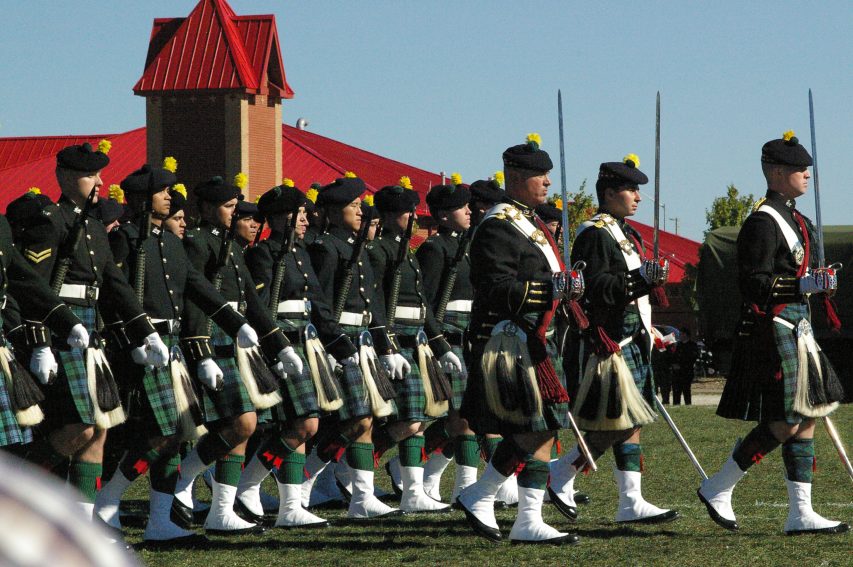
The Lorne Scots (Peel, Dufferin and Halton Regiment) on parade in Brampton, Ontario on 24 September, 2016.
Photo by Nicholas Russon.
An army brigade commander has told the 14 Ontario reserve regiments under his charge that they must cancel any “church parade” they have planned.
Despite a lack of complaints about the parades, which see soldiers march to their regimental church, Col. Daniel Stepaniuk urged his commanding officers to stop participating in “any event where the primary purpose is liturgical, spiritual or religious … even if the service is non-denominational.”
A custom in the Canadian Army since the time of Confederation, the parades aren’t as common as they once were, though many units still have at least one a year, often tied to Remembrance Day ceremonies.
[…]
First of all, there is the glaring contradiction with Stepaniuk’s harsh stand on church parades and a parade that happened in Toronto last April.
A group of soldiers — I counted between 15 and 20 — were issued weapons, allowed to march in their military uniforms and were escorted by an armoured vehicle in the annual Khalsa parade for Canada’s Sikh community. It is considered a holy day.
The soldiers were from the Lorne Scots, one of Stepaniuk’s reserve units based in Brampton. The CO of the unit said at the time that he signed off on the weapons only after his commander (that would presumably be Stepaniuk, or perhaps the brigadier-general above him) approved the soldiers’ participation.
So weapons worn at a Khalsa Day parade good, though against the rules (The Canadian Armed Forces Manual of Drill and Ceremonial), according to army spokeswoman Karla Gimby.
But soldiers going anywhere near a church, bad, and against rules five years old that no one cared to enforce until now.
But most of all, in such small incremental strikes, does Canadian history and tradition lose strength.
October 16, 2019
QotD: Childhood fears of nuclear armageddon
When I was a kid I was terrified of the End of the World. Kids heard things; older kids who’d read that ridiculous end-times tract, The Late Great Planet Earth said it foretold a struggle between the “bear” and the “eagle” and we all knew what that meant. One summer at Bible Camp I asked one of the pastors if this bear-eagle end-of-the-world stuff was true, and he said “we know not the day or the time.” You know, I thought, but you just won’t tell us.
It was 1968. On the night before the last day of camp, a counselor named Charlie Brown interrupted our sunset meeting by the shores of White Bear Lake to tell us the news: Russia had launched their missiles and they would destroy America before the night was out. It was time to get right with God.
Silence; crickets; small sobs. I’m sure no one thought much about Jesus right then. We thought about Mom and Dad and Spot and our room, where we really, really wanted to be right now, with the familiar smell of the goldfish bowl, and —
Charlie Brown guided us through some prayers. We all said Amen, and I’m sure for some it was the least heartfelt Amen we’d ever said. Then Charlie Brown said he had made up the story. Russia hadn’t launched the missiles. But what if they had? Were we right with Jesus?
Back at the barracks we were quiet and unnerved. No one wanted to go to sleep. No one wanted to talk, either. Finally John Larson, the bunkhouse bully, broke the silence. He was the mean kid. He was the one who tormented me at home, and had bothered me at camp. Nelson Muntz without the charm. John Larson expressed his simple wish to stab Charlie Brown in the stomach.
A dozen little Lutheran campers nodded in the dark: ya sure, you betcha.
James Lileks, The Bleat, 2003-09-11.
October 5, 2019
Losing our religion
Arthur Chrenkoff found another report on the inverse relationship between development and religious belief:
A few weeks ago I wrote a longish blog post arguing that for many people in the developed world environmentalism has become a religion, filling up the gap in spirituality left by the decline of Christianity. I don’t claim any originality or new insight in this observation; it has been noted many times before, including by my friend, former artilleryman and now man of God, Rev Donald Sensing, and it has made an appearance quite a few times subsequent to my piece, a propos Greta Thunberg’s performance at the United Nations and the reaction it inspired around the (developed) world.
Today, I chanced upon another interesting analysis by Pew Research Center, about religious belief and commitment around the world. Results are not surprising but are nevertheless interesting, including this world map:
Unfortunately, Pew does not provide additional data on those for whom religion might be “important” or “somewhat important” so as to paint a slightly fuller picture of religious sentiment, but the results illustrated above are probably quite indicative. The developed world is well and truly secular now, with the United States and Greece being the only outliers (and by a long mile), while most of the developing world (with the notable exception of China after seven decades of communism) remains extremely religious. Thus, Pew notes that “if current trends continue, countries with high levels of religious affiliation will grow fastest. The same is true for levels of religious commitment: The fastest population growth appears to be occurring in countries where many people say religion is very important in their lives.”
As the main topic of this Pew study is the age gap in religious faith around the world, it should be noted that the younger generations in the developed world are even less religious than their elders, often significantly less, putting the already low rates across the West in an even starker perspective (by contrast, throughout most of the developing world, there is little, if any, gap in religious commitment between the young and the old).
October 3, 2019
The Puritans, then and now
Severian thinks on churchiness and churchianity in our times:
The most striking fact about the Middle Ages from a modern perspective is their love of lists, categories, forms. This is partly practical — Church art all looks the same because it has to communicate a consistent message to the aforesaid illiterate peasantry — but lots of it isn’t. They were simply obsessed with forms, with outward order, to the point that even the few true individuals were hard to tell apart — William of Ockham and Thomas Aquinas were as different as two thinkers could possibly be, but unless you’re a subject matter expert, their writings look identical.
“The Crucible” by Len Radin is licensed under CC BY-NC-SA 2.0
“Individuality,” on the other hand, comes from inward experience. What, if anything, did the medieval peasant believe when he went to Mass? Impossible to say, but one of the reasons that’s so is because the form of his “piety” was so all-encompassing. Some years back, a Jew wrote a funny book about trying to live his life by the letter of the Mosaic law. One could do the same thing with medieval Catholicism. Take a gander at the liturgical year — hardly a day goes by without a feast, a commemoration, a celebration. Do all of that, and you’ll hardly have time for anything else. They were so focused on the outward show, at least in part, because there was so much showing to do.
When the Reformation shitcanned all that, piety turned inward. There are zillions of sources for what the Reformed believed (or, at least, said they believed), because the Reformation was a middle-class pursuit and the middle classes were literate … and, crucially, had the free time to be literate. I’m guessing here, but since people are people and always have been, I’m pretty sure that your medieval peasant loved the show of his religion, because it gave him a little much-needed time off from his hourly grind of back-breaking, ragged-edge-of-survival physical labor.
Your middle-class incipient Calvinist, on the other hand, was bored to tears with stuff like “creeping to the cross” — all those billable hours lost (surely no one is surprised that Calvin, Knox, et al were all lawyers or merchants). In their vanity, they insisted it wasn’t enough to seem pious; you actually had to be pious, which meant putting the time you would’ve spent doing public penance into contemplating the state of your soul. Check out The New England Mind — once you fight through prose, you’ll see that the vaunted Puritan piety was little more than Special Snowflakism with a New Testament twist. They’re “individuals,” all right, but only because they’re as obsessed as Tumblrinas with their very own pwecious widdle selves.
The point of this isn’t just to bash Puritans, fun as that is (and as richly as they deserve it). The point is that, as Current Year America is a thoroughly Puritan nation, we have to realize just how historically contingent Puritanism really is in order to beat them.
Puritans desperately wanted to be individuals in a world that couldn’t support very many individuals. You need a lot of free time to be a Puritan, and in the 16th century free time was almost inconceivably expensive. Whatever else it was, Puritanism was gross conspicuous consumption — Puritans announced to the world that they alone had the free time to indulge in expensive educations, books, Bible study, and the endless hours worrying about whether or not it’s Biblically justified to paint the altar. In a world where most everyone still knows someone who knows someone who starved to death, that’s one hell of a statement.

